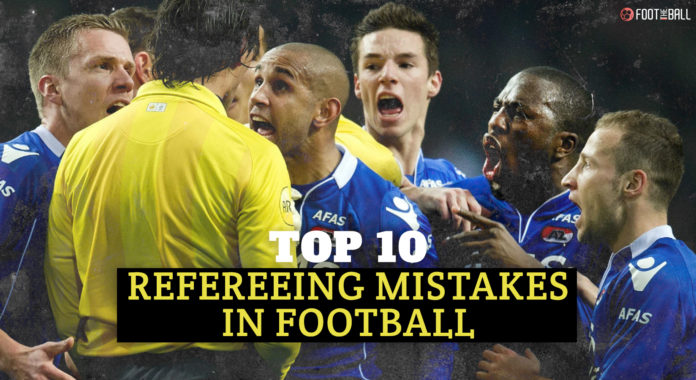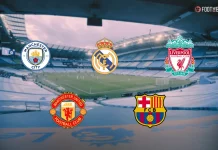In football, the players, managers, and fans always hog the limelight. However, there are many times that referees take centre stage in a game. For a referee, the best compliment is if he manages to stay away from the spotlight. But unfortunately, referees sometimes make decisions that defy logic in such a game of acceptable margins.
These decisions are so controversial that many have etched their name in the history of football. And while the introduction of technology such as the Visual Assistant Referee (VAR) has reduced the number of controversial calls, the mistakes remain.
FIFA has now announced the introduction of the Semi-Automated offside technology, which will further increase the role of technology in the game.
However, the game still is controlled by a human referee who can still make mistakes. So, we look at football’s top 10 worst refereeing decisions.
10. Pique’s handball against Chelsea- 2008/09 Champions League
The entire game was controversial, leading to the famous “It’s a disgrace. It’s a fu**ing disgrace” moment from Didier Drogba. However, the most contentious mistake was when the referee didn’t award a clear penalty for the second time after a clear handball.
Michael Ballack was so frustrated that he chased the referee for 30 yards pleading with him to award the penalty. Reflecting on his performance, referee Tom Henning Ovrebo said, “It was not my best day”. Some days you are not at the level you should be. No, I can’t be proud of that performance.”
9. Josip Simunic gets three yellow cards in a single game- 2006 FIFA World Cup
Football is simple. If you get yellow-carded twice, you get sent off. Unless you’re Josip Simunic. At the 2006 World Cup, Australia faced Croatia in a Group F match. The Croatian defender got his first caution in the 61st minute of the game. Then, in the 89th minute, Simunic received his second yellow card but was amazingly not sent off by referee Graham Poll.
Four minutes later, he would receive his marching orders after receiving a third yellow card. The referee Graham Poll was the favourite referee for the World Cup Final. However, he was suspended in the middle of the World Cup.
Graham Poll's infamous 3 yellow cards to Croatia's Josip Simunic vs Australia 2006. pic.twitter.com/WvwX4lUAmL
— Planet World Cup (@PlanetWorldCup) March 18, 2015
8. Watford vs Reading: The Ghost Goal
Stuart Attwell had a fantastic start to his career as he became the youngest referee in the Premier League. However, three months later, he would make one of the worst decisions in football. In a Championship game between Reading and Watford, Attwell awarded a goal when the ball was not near the net.
After Watford cleared the ball yards ahead of the goal, Attwell’s assistant Nigel Bannister flagged for a goal instead of a corner kick. The game led to Attwell and Bannister’s suspension for six weeks.
8. Dubious referee call decides 2000 AFCON final
In 2000, Nigeria faced Cameroon in the AFCON final, looking to win their third African championship. Instead, the game went all the way to a penalty shootout when the referee adjudged Victor Ikpeba’s shot to have not crossed the line even though it did.
It would give Cameroon the ultimate advantage as they won their third AFCON title.
7. The Red Card Conundrum- 2013-14 Premier League
Arsene Wenger’s 1000th game for Arsenal was a game against city rivals Chelsea. However, it would not be a moment for celebration as the Gunners were smashed 6-0. Instead, however, the game would be remembered for another incident.
With Chelsea leading the game 2-0, Alex Oxlade Chamberlain blocked a goal-bound shot from Eden Hazard inside the penalty area. The referee produced a straight red card, which was the correct decision. But instead of Chamberlain, he showed it to left-back Kieran Gibbs.
RED CARD Arsenal's Kieran Gibbs has been sent off… #CHEARS
— Premier League (@premierleague) March 22, 2014
Chamberlain pleaded with the referee that it was him and not Gibbs that had handled the ball, to no avail. Andre Marriner apologised for the mistake after the match.
6. Frank Lampard’s disallowed goal- 2010 FIFA World Cup
Geoff Hurst 2.0. In the 2010 World Cup, Germany faced England in the Round of 16. The Germans went 2-0 up before Matthew Upson pulled one back for Fabio Capello’s men. Then in an exact repeat of the 1966 World Cup final, Frank Lampard took a shot from outside the box, which hit the bar and landed inside the goal before bouncing back to the post and into the hands of Manuel Neuer.
The ball had landed inside the goal, but neither the referee nor the linesman seemed to think so. Thomas Muller would add two more goals in the second half to help Die Mannschaft into the quarter-finals.
5. Ahmet Akcay: Referee’s goal decided Turkish league champions
There have been many instances when players have scored a goal at a crucial time to win a match or championship. However, there is one instance where a referee’s goal decides the championship outcome. In a game between Ankaragucu and Besiktas in 1986, the home team scored a goal that went in after taking a deflection from referee Ahmet Ackay.
While the goal should have been disallowed in ordinary circumstances, Ackay thought nothing of that sort. Ankaragucu won the match 1-0, and at the end of the season, Besiktas lost the league by one point. Due to their superior goal difference, Besiktas would’ve won the championship if the goal had been disallowed.
4. Harald Schumacher’s tackle makes Patrick Battiston go into coma
How deadly can an on-field collision be in a game of football? For Patrick Battiston, it was a close brush with death. In the 1982 World Cup, France were one of the title’s favourites and faced West Germany in the semi-finals. While the game was a brilliant affair, it was marred by one controversial decision.
German goalkeeper Harald Schumacher collided with French defender Patrick Battiston which was so intense that it sent the Frenchman into a coma. Battiston had two broken teeth, broken ribs and damaged vertebrae. He had to be administered oxygen on the field.
Battiston managed to reach the ball first and flicked it. However Schumacher leapt into the air as the ball sailed past him. Schumacher, flying through the air, collided dangerously with Battiston. The resulting heavy contact from collision knocked Battiston unconscious. pic.twitter.com/qMErqWZjzd
— La Senyera (@LaSenyera) June 5, 2018
The backlash was so intense that Schumacher was voted the most hated person in France ahead of Adolf Hitler in a French newspaper poll. However, the most surprising part was that the goalkeeper was not sent off, and the referee awarded a goal kick to the Germans.
2.Thierry Henry’s hand sends France into the 2010 World Cup
France have a strange relationship with the World Cup. Either they perform very well, or they crash out early. Before the 2010 World Cup, they were in their second mood. The French had performed poorly in the World Cup qualification and now faced Ireland in the play-offs.
As the match went into extra time, Thierry Henry deliberately handled the ball before setting up William Gallas to score the winner. Despite fervent Irish protest, the goals stood, and France went on to qualify for the World Cup. However, they would be knocked out in the group stages to offer some respite for the Irish fans.
1. Diego Maradona’s Hand of God- 1986 World Cup
Of course, it had to be number one on the list. In the 1986 World Cup, Diego Maradona was in the form of his life. And they faced England in the quarter-finals. In addition, the match became politicised due to the Falkland War between the two countries.
And the drama on it would match its raw emotions of it. In the 51st minute of the game, Steve Hodge’s miscued clearance would rise high up in the air before Maradona would leap up and use his hand to put the ball past a hapless Peter Shilton.
Reliving Maradona's hand of God goal.. it changed the course of the 1986 #FIFAWorldCup pic.twitter.com/bKTEmrXd3f
— Shrinivas Dempo (@ShrinivasDempo) April 7, 2022
The English, especially Shilton’s vehement protest, would fall on deaf ears. Then, four minutes later, Maradona would score perhaps the best goal of his career as he dribbled past five English players to score. Argentina would go on to defeat West Germany in the final to win their second World Cup.
*This article is sponsored by Data Security Council of India (DSCI), is a not-for-profit, industry body on data protection in India, setup by NASSCOM®, committed to making the cyberspace safe, secure and trusted by establishing best practices, standards and initiatives in cyber security and privacy.




